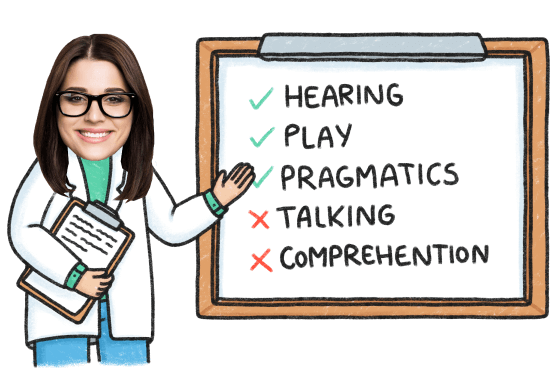How to Nurture Play Skills in Children with Autism
Feb 10, 2022 For the uninitiated, two of the most common questions that new parents of kids with autism are how to play with an autistic child, and is there such a thing as autism play therapy? Well, the answers are out there, and parents just have to know where to look. This blog presents information about to understand how play can help a child on the spectrum, as well as some therapy approaches to your child thrive.
In This Article
When your child receives a diagnosis, it’s important to learn how to play with an autistic child. Ask a play therapist how to make playtime count by introducing autism play therapy suggestions and approaches.
Children with Autism Spectrum Disorder (ASD) are, first and foremost, children.
They need to go through the same stages of development as anyone else. It might take a little longer for some skills. It might be that they are advanced in others. What is true, though, is that play can and does have profound effects on their social, mental, and emotional development.
Play is always therapy; play for kids with ASD is even more therapeutically valuable.
Professional-Directed Play
Many parents enlist the help of professionals qualified to introduce play therapy to their children with ASD. The training for these therapists allows them to introduce play to children and their parents to help achieve better results.
- Integrated Play Groups (IPG) are integrated with children with ASD and those who are neurotypical. There are often no more than five kids of like age in each group, and usually, two have ASD. Children with ASD learn firsthand how other kids play. The groups meet several times a week and stay involved as long as they are making progress.
- Joint Attention Symbolic Play Engagement and Regulation (JASPER) is a method that seeks to improve the social attention skills of kids with ASD. The aim is to widen his focus from spinning a toy car’s wheels to playing with the toy as a car. This lets him play more normally with other children.
Parent-Directed Play
Suppose parents are fortunate to live near therapists or treatment centers for ASD. In that case, they should consult with the therapists to attend sessions to learn how to use these techniques at home. If a child’s siblings and parents can reinforce play therapy techniques, it’s a big win for the ASD child.
Here are some ideas that work well in a home setting and will reinforce neurological gains.
Hypersensitivity
Kids with ASD are often more than normally sensitive to touch, painful stimuli, or difficulty judging where their bodies are in space (proprioception). By introducing the stimulus gradually and repeatedly, the child may be able to tolerate more exposure.
For instance, if a child hates the feeling of water on her skin, try dipping your own finger into a small bowl of water, then using it like fingerpaint on your hand. Do this several times a day without offering the child a chance to play. Once she is interested in what you are doing, ask if she wants to try. This is a long-term therapy, so expect it may take weeks or months to see an improvement.
How to Play
Kids with ASD often play with objects in a way not usually done by neurotypical children. They are often more interested in engaging in parts of a toy rather than playing with it as a whole object.

If your child is very interested in one toy, say a car or truck, watch how she plays with it. If she just wants to watch the wheels go around, here’s a chance to show her another way to play.
Get a similar toy vehicle that will be “yours.” Get down on the floor at your child’s level and sit nearby. Play with the car in the usual way. Add a few vroom-vroom sound effects to try to attract your child’s attention.
You are merely there to demonstrate how the vehicle is operated to have more fun.
Relationship-based Therapy
Experts have studied the difficulty with touch sensitivity in ASD. They now believe it is this hypersensitivity that is responsible for their problems with social behavior. Many families are distressed when the child with ASD rarely acknowledges their existence and might seem to not understand that the child and other persons are alike.
Applied Behavior Analysis (ABA)
This therapy is based on what we know about social relationships behaviors. ABA has been used for decades to assess each child with ASD and prescribe treatments that deal best with the individual needs.
ABA seeks to accomplish the following:
- Increase language and communication skills
- Improve attention, focus, social skills, memory, and academics
- Decrease problem behaviors
Floortime Play Therapy
One of the most used and newest therapies for social skills is called Floortime. The term means where the treatment takes place, on the floor at the child’s level. The parent takes part in the child’s play at his level without teaching or instructing in how to play. Professionals teach and coach parents in this method.
There are six milestones in Floortime:
- Self-regulation and interest in the world
- Intimacy, or engagement in relationships
- Two-way communication
- Complex communication
- Emotional ideas
- Emotional thinking
Each child, each parent, and each family are different and have special needs. Using therapy in any of the above forms is crucial to the child with ASD moving ahead physically, intellectually, and socially. Parents will probably find that consulting a professional in ASD therapy will be a winning solution.
Above all, be patient, be kind, and play!
Have a question for our Speech Therapists?

